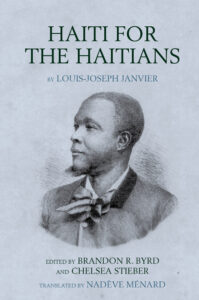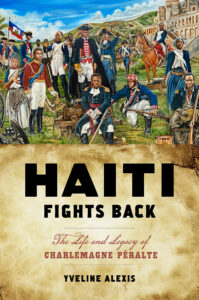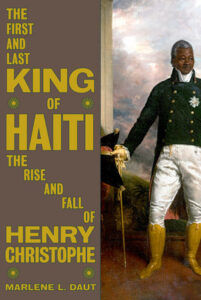
Five Essential Books For Understanding Haitian History
Cundill Prize Finalist Marlene L. Daut Recommends Baron de Vastey, Jean Casimir, Louis Joseph Janvier and More
After waging a thirteen-year revolution against slavery in the French colony of Saint-Domingue, the island’s Black freedom fighters declared their independence on January 1, 1804. In the country’s first constitution, issued one year later, the newly renamed Haiti subsequently became the first nation in the modern world to permanently abolish slavery. In a move as equally momentous, in 1807, the Haitian state became the first to declare slavery and the slave trade a “crime against humanity.” Yet even though Haitians ended slavery more than three decades before Great Britain, more than four decades before France, and more than six decades before the United States, Haiti is often left out of the story of how the world went from slavery to freedom.
The Haitian anthropologist and historian Michel-Rolph Trouillot most forcefully signaled the damning implications of eliding the world-historical significance of the Haitian Revolution in his well-known book Silencing the Past: Power and the Production of History (Beacon, 1995). Trouillot insisted that the “silencing” of the Haitian Revolution (1791-1804) is only “a chapter within a narrative of global domination.” “It is part of the history of the West,” he said, “and it is likely to persist, even in attenuated form, as long as the history of the West is not retold in ways that bring forward the perspective of the world.” By erasing, downplaying, or otherwise denying how the Haitian revolutionaries opened the door to the Age of Abolition—when they proclaimed slavery an actual crime and declared that freedom from slavery should be constituted as a universal human right—it is not just Haitian history, but the Haitian people themselves who have been silenced.
The remarkable stories of some of Haiti’s most famous Black freedom-fighters, Dutty Boukman, Cécile Fatiman, Toussaint Louverture, Suzanne Bélair, Jean-Jacques Dessalines, and Henry Christophe, for example, have been replaced in the world’s memory by the more treacherous recent histories of dictatorships, earthquakes, presidential assassinations, and armed paramilitary violence. Moreover, in the nineteenth century, instead of garnering global applause, Haiti’s insistence on remaining free and independent consistently brought punishment, most aggressively, by France. In 1825, French king Charles X ensured longitudinal impoverishment of the newly independent country when he ordered the Haitian government, under threat of war, to pay 150 million francs as the price of France relinquishing its territorial claim over the island and to compensate former French enslavers for the loss of their “property.”
Bringing forward the perspective of Haitians represents one way to both lessen the silences of the past and rectify the ongoing and harmful distortions of the present. In my recently published biography, The First and Last King of Haiti: The Rise and Fall of Henry Christophe, I therefore sought to highlight the stories of eighteenth- and nineteenth-century Haitians, whose numerous memoirs, pamphlets, letters, and myriad collections of essays and other forms of writing about the Haitian Revolution have often been ignored in favor of consulting western European and U.S. sources. At the same time, an incomplete and sometimes non-existent written archive encouraged me as a historian and literary critic to be imaginative in considering alternative sources about King Henry’s life, including oral histories, and to question the privileging of written forms over other kinds of storytelling.
The present list of books, then, all by Haitian authors, is a further attempt to contribute to Trouillot’s wish for the “perspective of the world” to be brought forward. Spanning nearly the entirety of Haiti’s history, from the period of colonization in the eighteenth century, to the revolution and war of independence in the nineteenth, to the U.S. occupation in the early twentieth, to Haitian women’s cultural contributions at the turn of the century, these books tell complicated and nuanced stories about Haiti and Haitians’ attempt to create a sovereign existence in a world where Black freedom has been endlessly under threat.
*

Baron de Vastey, The Colonial System Unveiled (2014, Liverpool University Press)
In 1814, in the city of Cap-Henry (Cap-Haitien), King Henry Christophe’s most prolific secretary, Baron de Vastey, published a striking testimonial against slavery, Le Système colonial dévoilé, or The Colonial System Unveiled. In this slim work, Vastey catalogued more than 100 forms of torture perpetrated by the French colonists of Saint-Domingue against the people they had enslaved. Vastey also lambasted the already voluminous writings on the Haitian Revolution produced in Western Europe and the United States, which decried the violence of the enslaved freedom fighters during the Revolution while silencing the inherent violence of slavery itself. It is telling that Vastey’s most damning exposé of the inhumanity of colonialism and slavery (he authored ten other works, three of which were immediately translated into English) was never fully translated into any language in his own era and that it took 200 years for it to appear in English translation in our own. The catalog of abuses he records, while providing the exact names of the guilty colonists, is in large part responsible for the silencing of Vastey’s voice.

Jean Casimir, The Haitians: A Decolonial History (University of North Carolina Press, 2020)
In a sweeping narrative that spans from the revolutionary era to the early twentieth century, Casimir explains how the counter-plantation, derived from New World African political and cultural practices, particularly marronnage (or fugitivity), has been used by the Haitian populace to safeguard life in the face of daily oppression. In Haiti, small plots of land inhabited and worked by generations of the same family in the countryside are called the lakou. Living on the counter-plantation, or the lakou, involves relying upon small-scale landholding to resist the oppressions of the traditional plantation, the factory, and more recently, the industrial farm. By focusing on the methods used by Haitians living outside of urban environments to survive under slavery, colonialism, and now global modernity, Casimir shifts our focus away from the traditional subjects of Haitian historiography, the elites and those who recorded their histories.

Louis Joseph Janvier, Haiti for the Haitians (Liverpool University Press)
Janvier published the essays that make up Haïti aux Haïtiens in haste in 1884 to express his displeasure at the news that James G. Blaine, former secretary of state under U.S. president James Garfield, was chosen as the Republican candidate at the 1884 Chicago Convention. Janvier’s disdain for the Republican nominee was directly related to the fact that not only did Blaine openly support and defend the so-called Monroe Doctrine, but he was known to have repeatedly and publicly uttered the phrase, “America for the Americans.” Janvier clearly understood Blaine’s co-optation of the phrase to mean that the United States sought control over the entire American hemisphere, including Haiti. Janvier patently criticized and rejected the increasing encroachment of the U.S. in the American hemisphere, at the same as he sought to dismantle the stereotype that Haiti could not govern itself and was therefore in need of U.S. imperialism. Janvier insisted, in fact, that despite internal domestic upheaval in his country, “even westernized Haitians do not want anything in the world to do with the idea that Haiti would become a colony or even a state [of the US].”

Yveline Alexis, Haiti Fights Back: The Life and Legacy of Charlemagne Péralte (Rutgers University Press, 2021)
In 1915, U.S. President Woodrow Wilson’s administration used the murder of Haitian president Vilbrun Guillaume Sam, as a pretext to invade. The real reason for the invasion, however, was economic. Fearing that further upheaval in the Haitian government might cause Haiti to default on U.S.–backed loans (some of which were related to the disastrous indemnity France forced Haiti to pay throughout the nineteenth century), the U.S. ordered marines to seize $500,000 worth of Haiti’s gold reserves. The U.S. stayed in Haiti for 19 long years after that, the second-longest military occupation in U.S. history after Afghanistan. More than 15,000 Haitians lost their lives fighting against the United States’ seizure of Haitian sovereignty, including Charlemagne Péralte, the subject of Yveline Alexis’s engrossing and tragic account of the Occupation.
In 1919, Péralte, a Haitian nationalist, led a rebellion against the Occupation; U.S. soldiers retaliated by brutally executing him and then circulating a photograph showing him in a crucified pose as a warning. The United States’s defeat of Péralte’s opposition, called the Cacos rebellion, was widely viewed by Haitians as having upended the Haitian revolutionary principles of freedom and independence upon which their country was founded while encouraging rule by force. As Alexis details, the memory of this neo-colonialism, euphemistically called “occupation”—along with those more recently in 1994 and from 2004 to 2017—has cast an ongoing shadow over Haiti’s momentous past as the first nation to permanently abolish slavery.

Myriam J.A. Chancy, Framing Silence: Revolutionary Novels by Haitian Women (Rutgers University Press, 1997)
Given the utter frequency with which Black women appear in radical and resistant roles in historical accounts of the Haitian Revolution, it is in fact astonishing that more attention has not been devoted to addressing the stories of Black female revolutionaries in Haiti. The work of Haitian feminist scholars like Myriam J.A. Chancy has been crucial to not only calling attention to this ricocheting form of silencing, but to integrating the history and lives of Haitian women into the official historical record where they are largely absent or glossed over.
In her book Framing Silence, by focusing on the writings of Haitian women novelists, like Edwidge Danticat and Marie Vieux Chauvet, but also more overlooked earlier voices such as Annie Desroy, Nadine Magloire, and Virgile Valcin (Cléanthe Desgraves), Chancy expanded the canon of Haitian literature and showed us how to read the characters in these books not merely as literary figures but as themselves theorists of lived, gendered, and postcolonial experience in Haiti. As Chancy explains, “Since a codified history of Haitian women has yet to be written, the project of recovering the roots of Haitian women’s self-definition is made possible only through the evaluation of narrative forms.” By tackling the literary as historical, and vice-versa, in her examination of representations of Haitian women by Haitian women, Chancy offers a “feminized reading” of Haiti’s past that distinctly blurs the seemingly intractable line between fiction and history.
__________________________________

The First and Last King of Haiti: The Rise and Fall of Henry Christophe by Marlene L. Daut is a finalist for the 2025 Cundill History Prize.
Marlene L. Daut
Marlene L. Daut is Professor of French and African Diaspora Studies at Yale University. She teaches courses in anglophone, francophone Caribbean, African American, and French Colonial and historical studies. She has written for The New Yorker, The New York Times, The Nation, Essence, and Harper’s Bazaar. She lives with her family in New Haven, Connecticut.



















